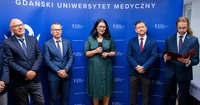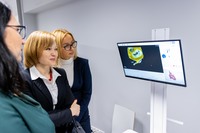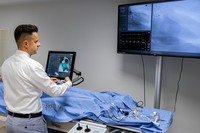Unique cardiovascular simulators at the Medical University of Gdańsk
25.11.2019
The first national Cardiovascular Simulation Centre has officially stared operating at the Medical University of Gdańsk. The opening ceremony, along with the presentation of the equipment purchased under the project, took place on November 21st. The following notable guests were present: Małgorzata Zadorożna, Acting Director the Department of Medical Qualifications and Science of the Ministry of Health, Adam Sudoł, Deputy General Director of the UCC for Medical Logistics Marta Fijołek, substantive supervisor of the project from the Ministry of Health and partners from the Institute of Cardiology of the Primate of the Millennium Cardinal Stefan Wyszynski – Prof. Cezary Kępka, Deputy Director, Prof. Hanna Szwed, Head of the 2nd Coronary Disease Clinic and Patrycjusz Stokłosa, Ph.D., Head of the Echocardiography Laboratory at the Clinic of Heart Defects.
– During my times as a medical student and an adept at learning my profession, such training opportunities were not available – recalls Prof. Marcin Gruchała, rector of the MUG and a cardiologist. – Now, the doctors can practice their skills before coming into contact with an actual patient. It’s like learning to fly in a flight simulator. You can also analyse the procedure that you performed to see whether it was performed in an optimal way. This is not only about training new specialists, but also about improving and maintaining the qualifications and skills of the current medical staff.
The MUG’s Cardiovascular Simulation Centre laboratories are equipped with six phantoms for non-invasive echocardiographic tests, the so-called transthoracic and low-invasive, esophageal and one phantom for coronary heart and vascular examinations, coronarography (invasive cardiac examination), angioplasty, i.e. the mechanical widening of narrowed coronary arteries supplying blood to the heart, and even implantation of heart valves without opening the chest.
– The phantoms allow one to learn how to react properly in a wide spectrum of situations. So far, none of the the Polish medical universities has ever trained cardiologists through simulation – adds Prof. Marcin Fijałkowski, the Centre’s coordinator. – The Centre allows you to practice very complicated procedures in simulation conditions before doctors come to perform them in a situation of real surgery in the operating room.
The Institute of Cardiology of the Primate of the Millennium Stefan Wyszyński, the main clinical centre of cardiology and cardiac surgery with the highest degree of reference and an important centre of postgraduate education in the field of cardiology in Poland, partners the project. – The simulation centre in Warsaw will start operating in December – says Prof. Cezary Kępka, the Institute’s Deputy Director. – There is a huge interest in such courses. At the moment we educate mainly cardiologist. However, we want to expand our offer with courses for, among others, cardio-anesthesiologists as well as surgeons and vascular specialists who will perform chest or vascular procedures.
Training for doctors consist of three modules: transesophageal echocardiography, interventional cardiology and training in so-called basic diagnostics in life-threatening conditions (Point of Care).
There are both basic and advence courses in the transesophageal examination. The phantoms indicate the correct projections of the heart’s anatomy. If the students obtains a projection close to the ideal, he can deem it as correct. If not, he must repeat it until the correct one is reached. Then he moves on to the next one. Phantoms also simulate various diseases that must also be taken into consideration by the dector during the examination. A more advanced transesophageal echocardiography course teaches 3D imaging and various complicated pathologies. The Point of Care course is addressed to adept echocardiographers. They can examine the Phantom through the chest, then they get a portable echocardiograph to the hospital where they work every day, they can record tests and verify what they have learned during the training. They can also consult the results of these tests during three hour sessions with highly-trained specialists. This course is unique on a European scale.
In total, 900 doctors from Poland are to be trained in two simulation centres – the Medical University of Gdansk and the Institute of Cardiology of the Primate of the Millennium Stefan Cardinal Wyszyński in Anin. Classes last for 2 days and 20 students can train simultaneously on six phantoms.
These courses are organized under the ‘Improving the quality of highly specialized postgraduate education in cardiology’ project financed by the Ministry of Health from the European Social Fund under the Operational Program Knowledge Education Development (POWER) for 2014-2020. The budget of the project exceeded over 10 million PLN and included both the costs of the training and purchase of specialized equipment.
Archives
- Academic Year 2024/2025
- Academic Year 2023/2024
- Academic Year 2022/2023
- Academic Year 2021/2022
- Academic Year 2020/2021
- Academic Year 2019/2020
- Academic Year 2018/2019
- Academic Year 2017/2018
- Academic Year 2016/2017
- Academic Year 2015/2016
- Academic Year 2014/2015
- Academic Year 2013/2014
- Academic Year 2012/2013


